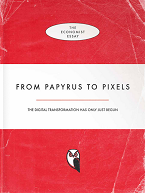![]() I say nothing new or astounding when I claim that technology is a disruptive change agent. We live in a time of rapid technological advances and take it for granted that the tools we use to complete tasks and achieve goals not only make our efforts to do that less labor-intensive, dangerous or boring, but also that they will evolve into something new, usually better, in a 3-5 year time span.
I say nothing new or astounding when I claim that technology is a disruptive change agent. We live in a time of rapid technological advances and take it for granted that the tools we use to complete tasks and achieve goals not only make our efforts to do that less labor-intensive, dangerous or boring, but also that they will evolve into something new, usually better, in a 3-5 year time span.
Something that does astound me is the fact that people are afraid of new technology. This goes back to ancient times, for as Baron (2009) reminds us, Socrates warned that use of the written word would ruin people’s memories as they would store their memories in texts rather than in their minds (p 4). And while written text surrounds us in contemporary life, only as far back as 600 years people worried about how the printing press would take jobs away from hard working monks. The concern should have focused more on how the printing press made it easier to share ideas with countless people across continents and cultures. Ultimately, it was this ability to not only record one’s own ideas but also to share them with people both known and unknown that did change the world.
But it was not the books themselves that actually changed the world; it was the ideas expressed within them that changed the world. Like the bumper stickers proclaiming

books are inanimate objects without agency. It takes a human to generate the ideas in a book and humans to record and transmit, or automated systems created by humans in the case of the internet, the resulting texts. Without human thinking and agency, texts, be they print or digital, cannot exist.
However, once texts do exist, the ideas they transmit can affect people, can inspire them to action. Evidence of this is the Western Renaissance, the Protestant Reformation as well as the political revolutions in the United States and France. Who has the time and resources to write a text? Who has the money and authority to produce and distribute a text? Who has the training to produce or consume a text? These are questions of agency, of the agency of literacy, that are more significant than the medium in which a text is manifested.
Access is a greater issue than form. We cannot stop the evolution of text from print to digital form. As evidence, take a look at this digital essay provided online  by The Economist: From Papyrus to Pixels: The Digital Transformation Has Only Just Begun (2011). Instead, what we should focus our attention on is who is creating our texts and why and who is able to access them and understand them.
by The Economist: From Papyrus to Pixels: The Digital Transformation Has Only Just Begun (2011). Instead, what we should focus our attention on is who is creating our texts and why and who is able to access them and understand them.
References
Baron, D. (2009) A Better Pencil: Readers, Writers and the Digital Revolution. New York: Oxford University Press.
Economist (2011). From Papyrus to Pixels: The Digital Transformation Has Only Just Begun. Available: http://www.economist.com/news/essays/21623373-which-something-old-and-powerful-encountered-vault
Masnick, M. (2001) A Fifteenth Century Technopanic About The Horrors Of The Printing Press. https://www.techdirt.com/articles/20110119/05022912725/fifteenth-century-technopanic-about-horrors-printing-press.shtml
Photo Credits
Guns don’t kill people: http://www.militariapress.com/category/Gun+Bumper+Stickers.html

No Comments so far ↓
There are no comments yet...Kick things off by filling out the form below.